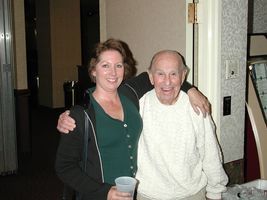Sol Lipkin - The Father Of Table Shuffleboard

Sol Lipkin Award Winners
SOL LIPKIN was inducted to the National Shuffleboard Hall of Fame (NSHF)
on his 90th birthday!! The following Sol Lipkin history and pictures were
published in "The Board Talk," Volume 13, No. 7, July 1996 and it is quite
some story with lots of shuffleboard history, with the American
Shuffleboard Company (later American International Shuffleboard
Corporation) for several decades and was still involved in the business at
the age of 90 when he was inducted into the NSHF in May 1996.
In May 1996, Sol Lipkin became the first person inducted into the National Shuffleboard Hall of Fame as a "promoter" of the game. The news was announced at a special celebration of Sol's 90th birthday. Family, friends, and associates from The World of Shuffleboard were on hand to honor Sol and celebrate his long and successful career.
The petition for Sol's induction was submitted to the NSHF Board of Directors by Phil Skover and John McDermott of The Shuffleboard Federation, Inc., and was supported by many fans and business associates from companies such as Triple Crown, Playfair, Gametime, Sun Glo, RePlay, Play Meter, Dave and Busters', and The Board Talk.
According to his son, Bruce, and others who know Sol, his primary motivation has always been love of the game of shuffleboard. The financial compensation was not large and the personal hardships he endured being on the road so much of the time is evidence that Sol truly cared about the sport.
In the '30s, he started his long career in shuffleboard as a salesperson for the National Shuffleboard Company, then became a representative for the American Shuffleboard Company. Competition between the shuffleboard manufacturers (National, American, Modern, Rock-Ola, Valley, etc.) was intense then and many believe Sol established American Boards as the industry standard.
He was first introduced to table shuffleboard in a church basement. "There was a time," he said, "when churches and exclusive hotels that catered to the rich were the only places that offered shuffleboard. It wasn't until the early '30s when taverns were dying despite 5-cent beer and free food, that boards were purchased with a small down payment and smaller weekly payments, to attract customers during the Depression." Sol admits to eating his share of the free food as he set up those deals.
During the '50s, Sol traveled the country selling boards, running tournaments, and setting up distributorships. In 1950, he staged a tournament in Illinois involving 574 teams from 14 states. He placed 12 boards in a rented, newly-built armory and used the services of an American Bowling Congress official to run the tournament. Why bowling? "We knew in order for it to click, we'd have to run it on frames -- 10 frames, five on each end," Sol said. And click it did. The single elimination, best 4 out of 7 tournament, started on a Friday and ended by 4 p.m. on Sunday. Illinois Gov. Adlai Stevenson (later a presidential contender) wrote a letter to Sol expressing his regrets that gubernatorial duties prevented him from attending this big tournament.
The pot for this big event was $2,500 to be split among the top eight teams, with $750 for first place, plus a new shuffleboard for the tavern owner who sponsored the winning team. It took tight organization to make this event involving 574 teams happen, including hiring young people for $1.50/hour to post scores, verified by judges, on large scoreboards at the end of each board. Sol appointed a five-member grievance committee made up of well-known, highly respected people in Illinois shuffleboard circles, but, he remembers, "We never had a dispute."
It wasn't just taverns where Sol promoted the sport and American shuffleboards. Churches, Salvation Army centers, the military, senior citizens, colleges, boys' clubs -- were on the American customer lists. During World War II, WACS, WAVES, and others in the armed services learned to love shuffleboard thanks, in large, to Sol's efforts.
A special challenge faced by Sol and other ASC staff during the '60s was installing a shuffleboard in the U.S.S. Theodore Roosevelt Polaris Submarine "down the hatch on a torpedo rack." During the long periods underwater, the sport of shuffleboard helped ease the stress of servicemen and provided exciting tournament play. The event could well be recorded as the first underwater shuffleboard tournament in history! ASC also placed shuffleboards in the recreation center at the Pentagon in Washington, D.C.
Sol has always been actively involved in shuffleboard league organization and support and was instrumental in writing of the American Shuffleboard Rule Book, one of the most widely-referenced rule books even today. Although he was the architect of the book, he realized it was out of date by the time the sport was undergoing a "revival" in the '80s and '90s. Despite reluctance of his employers to allow The Shuffleboard Federation to update the book, Sol went ahead and gave permission and took personal responsibility for doing so.
Sol has always been generous with his knowledge, expertise, and resources with others in The World of Shuffleboard. Two new entities born in the '80s -- The Board Talk and The Shuffleboard Federation, Inc., credit Sol's unwavering support with their "survival," sometimes against what seemed insurmountable odds.
In 1987, Sol was presented with a "Pioneer Award" from Bill Moore of Texas, and in 1992, he received a "Lifetime Achievement Award" from The Shuffleboard Federation. The Federation also established the "Sol Lipkin Award", presented to individuals as a symbol of utmost respect for "extraordinary contributions to the advancement of shuffleboard."
Just because Sol has reached his 90-year landmark doesn't mean he's ready to put the "gone fishing" sign on his New Jersey door. His most recent achievement was the successful negotiation and placement of shuffleboard tables in "Dave and Buster's," a national chain of huge entertainment complexes for the entire family in various metropolitan areas around the country. The average location has five boards and attracts about 1 million customers a year. The placement of boards in these places is a big step in bringing exposure and recognition to shuffleboard to an entirely new and very large audience.
He's also still involved in community service and recently sold the most American Legion poppies in his area -- 543 at $1 a pop! Widowed for a number of years now, he reports that he's "looking" (a healthy attitude for a 90-year-old). As Sol told John McDermott: "Johnny (Sol's the only person who dares to call him that), attitude is everything!!" (The Board Talk, Vol. 13, No. 7, July 1996)




